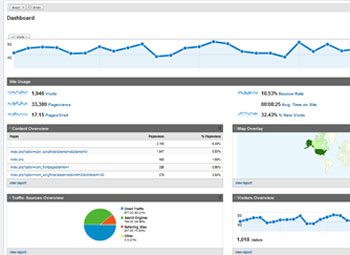Top of Mind from 3by400
How do you determine what is "fair"? I grew up in a time when not everyone got a trophy, grades were not assigned on a sliding scale, and no one bailed out businesses who couldn't figure out how to stay in business. That makes me sound really old, but I'm under 50. Two pieces of fresh news today lead me to believe that facts are becoming less and less important. First, I had to shake my head at a Business Insider "news" story that totally missed reporting on the new Google Conversion API because they were too busy complaining about the...

Presented June 24, 2009 Dahlonega Lumpkin-County Chamber of Commerce Nuts & Bolts Presenter: Beth Snider This session included an overview of Google tools for businesses and a look at top-level Google Analytics reporting. Discussion included understanding what reports indicate, how to translate indicators into changes that may be required on your site, and a basic understanding at how Google indexes your web site. 3by400-GoogleAnalytics (downloadable PDF)
If you’re a long-time Getting Informed reader, you will remember multiple previous references to the importance of web statistics, or stats, in understanding the effectiveness of your web site. In the past, most web site owners were just happy to see that cheesy hit counter increasing…you know, the one that looked like a digital readout. Today, it seems that the statistics being provided are bigger and better—and quite overwhelming for most site owners. And just to confuse things, the term analytics comes along to see if you’re paying attention. Analytics are statistics in a way that speaks to the average person rather than to the classic statistician. In short, analytics are where the rubber meets the road. But for the purposes of this discussion, information about site viewing data will be called statistics.
 There are few people in the country—possibly the world—who are not familiar with Google. Google has become synonymous with a new generation that is used to having all of the information of the Internet at their fingertips, since any topic can be found through the familiar Google search engine. As a project for Stanford graduates Larry Page and Sergey Brin, the world’s most thorough search engine now sets the rules for how web sites are indexed and promoted on the worldwide web. Google’s mission is to organize the world’s information and make it universally accessible and useful. The word “google” has even been made it into Webster’s Dictionary, officially defined as “to use the Google search engine to obtain information about (as a person) on the World Wide Web.”
There are few people in the country—possibly the world—who are not familiar with Google. Google has become synonymous with a new generation that is used to having all of the information of the Internet at their fingertips, since any topic can be found through the familiar Google search engine. As a project for Stanford graduates Larry Page and Sergey Brin, the world’s most thorough search engine now sets the rules for how web sites are indexed and promoted on the worldwide web. Google’s mission is to organize the world’s information and make it universally accessible and useful. The word “google” has even been made it into Webster’s Dictionary, officially defined as “to use the Google search engine to obtain information about (as a person) on the World Wide Web.”
